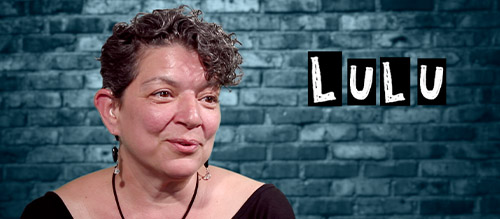Rebel Dykes (2021) Review – BFI Flare | The Film Magazine (original) (raw)
Rebel Dykes (2021)
Directors: Harri Shanahan, Sian Williams
Rebel Dykes is the feature length version of the 2016 documentary that explores the lesbian subculture of the same name born out the punk movement in 1980s London. The documentary explores how being a lesbian was not only a sexual orientation but a political identity; presenting the difference between what it deems to be mainstream separatist lesbians and punk Sadomasochistic (SM) lesbians.
The documentary works like a visual scrapbook, its collage style mixes interviews, archive footage, still images and animation. The style is reminiscent of homemade zines and creates a youthful and punk approach to the storytelling. This unique presentation makes Rebel Dykes not only enjoyable but inspiring.
The documentary begins by presenting Greenham Common and its ‘Hippies’ as the mainstream lesbians of the time. Rebel Dykes presents how some of these lesbian activists took against the fetish club Chain Reaction, which is heralded as the heart of SM lesbians. Chain Reaction was much more than a fetish club, it was a safe space for those who did not fit into the mainstream idea of what it meant to be a lesbian. However, Chain Reaction was targeted by ‘Feminists Against Violence Against Women’, who protested the very existence of SM Lesbians. The group believed that Rebel Dykes were inflicting the same violence on each other as men do on women, that they were acting in a patriarchal and fundamentally un-feminist way.
Lisa Power, LGBTQ+ rights campaigner and Secretary General of Stonewall, explores the notion presented by ‘Feminists Against Violence Against Women’ – that penetrative or sadomasochist sex is against the lesbian agenda – and resents how the mainstream group tried to enforce more and more rules about how to have feminist sex away from the violent confines of the patriarchy. She asserts that this was born out of genuine concern about male violence but led to a kind of ‘lesbian sex police’. The documentary explores how these two groups fought over the idea of ‘proper lesbian sex’. Roz Kaveney, writer and poet, jokes that the only way to have feminist lesbian sex was to hold hands in twenty passionate positions.
By the nature of the documentary, that it is the women themselves telling their story, there are some issues in Rebel Dykes. The documentary, as with many set in London, often ignores the reality of the rest of the country. One woman tells of how there were only three gay bars when she first visited London in the early eighties, as though the gay scene is now thriving everywhere. Some of the women who identity as Rebel Dykes have created a narrative that suggests the things they have done have benefited every gay person that comes after them. Like many LGBTQ+ documentaries that explore the past, Rebel Dykes seems to suggest that the struggles its subjects faced, such as street harassment or gay bashing, no longer exist for LGBTQ+ people now.
As this is a documentary that is specifically exploring a lesbian subculture, it is not expected that it will cover all aspects of LGBTQ+ life. It does touch on the trans experience within the Rebel Dykes as a group – Chain Reaction was celebrated for being trans inclusive despite a very trans exclusive scene – but there are moments where the documentary could have been much more inclusive, and it can feel at times like there is an attempt to erase bisexuality in their community. The Rebel Dykes History Movement is very clear that it is inclusive of lesbian and bisexual women be they cis, trans or non binary, but bisexual women are written out of their story. The documentary claims that it is okay to sleep with men and still call yourself a lesbian, moreover in reference to the AIDS crisis, one woman mentions that some of the women would sleep with gay men or ‘even just men’, completely ignoring bisexuality in what appears to be an attempt to preserve a wholly lesbian story.
Despite its shortcomings, Rebel Dykes illustrates the importance of having documentaries that tell of a truly female experience. Moreover, the documentary has humour and joy at its core. Although much of the focus of the documentary is exploring the political nature of the Rebel Dykes and how they came up against other lesbian groups, the documentary is also about the fun that they had. There is a section of the documentary about the introduction of the dildo onto the scene, a moment that expresses how the women do not take themselves too seriously.
Often women’s roles within the LGBTQ+ movement are often overshadowed by male experience. Many of the male activists and pioneers of the movement, in regards to organisations such as Stonewall, are household names. The obscurity of lesbian history is perhaps due to the fact that lesbians were never legally criminalised like gay men, but this does not mean that their struggles were not comparable. Rebel Dykes is not only a hugely entertaining and unique documentary, but a necessary story to be told and well worth seeking out.
19/24
